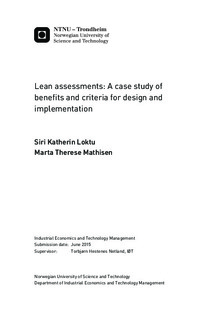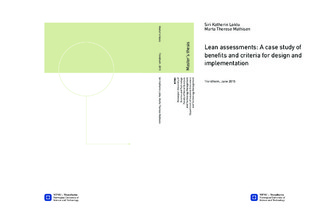| dc.contributor.advisor | Netland, Torbjørn Hestenes | |
| dc.contributor.author | Mathisen, Marta Therese | |
| dc.contributor.author | Loktu, Siri Katherin | |
| dc.date.accessioned | 2019-09-11T12:10:17Z | |
| dc.date.created | 2015-06-08 | |
| dc.date.issued | 2015 | |
| dc.identifier | ntnudaim:13115 | |
| dc.identifier.uri | http://hdl.handle.net/11250/2616264 | |
| dc.description.abstract | The aim of the study is to achieve greater understanding of how measurement can contribute to the process of implementing corporate lean programs in multinational companies. Many authors argue that lean assessments hold an important role in guiding lean implementation. Yet, little research has been done on how lean assessments actually affect lean implementation, and it is not clear whether the existing lean assessments found in literature are facilitating lean implementation efforts in an optimal way. Further, lean assessment literature does not seem to keep up with recent trends within lean literature: While companies are increasingly making tailor-made corporate lean programs, studies on lean assessments have little focus on whether or not assessments should be adjusted to fit the organisation. Also, experience has shown that many attempts to implement evaluation tools such as lean assessments fail. An assessment is successfully implemented when it is conducted regularly and results are being used for decision-making.
Thus, in this case study, we investigate how lean assessments should be designed and conducted to ensure they contribute optimally to lean implementation. Further, we contribute to the research on how lean assessments can add value to the organisation by identifying potential benefits and drawbacks, and important criteria that affect the success of lean assessments.
Empirical data has been gathered mainly through interviews with managers from eight different subsidiaries in Jotun. Observations and documents have however supplemented the interview-data. Empirical findings are presented and discussed in light of findings from literature. To ensure practical validity for managers, the study is structured in a process-oriented way, covering the whole assessment process. The discussion culminates into a process-framework for lean assessments. | en |
| dc.language | eng | |
| dc.publisher | NTNU | |
| dc.subject | Industriell økonomi og teknologiledelse | en |
| dc.title | Lean assessments: A case study of benefits and criteria for design and implementation | en |
| dc.type | Master thesis | en |
| dc.source.pagenumber | 141 | |
| dc.contributor.department | Norges teknisk-naturvitenskapelige universitet, Fakultet for økonomi,Institutt for industriell økonomi og teknologiledelse | nb_NO |
| dc.date.embargoenddate | 2020-06-08 | |

